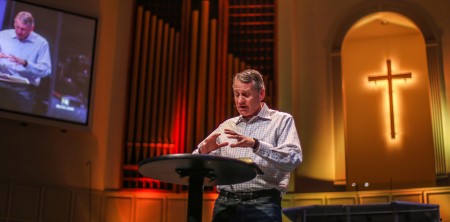
One reason we can expect smaller crowds upon church reentry is not the virus. That’s part of it for sure. It makes sense. Especially if you’re high-risk you should consider sheltering in place until it’s safe to return.
But many parts of the country are opening. I’m seeing lots of traffic on the streets. Restaurants are buys again. I haven’t been to a mall or department store, but I hear they have traffic again.
Many churches have opened for in-person services or are considering when that will be. Still, I would expect to open with a smaller percent of your average. And not because of the fear issue.
There is one reason we can expect smaller crowds upon church reentry.
It could even become the bigger reason.
One reason: HABIT
People have gotten used to worshiping in their pajamas. They like “not” being “late” for church. It’s been easy to “get the kids ready”. Bad hair days are not a problem. You can “worship” from anywhere. I’ve seen the trend in meetings where people could have been in person, yet chose to “zoom” in for convenience. I get it.
There will be a natural inclination among some to worship from home.
I’m not suggesting we ignore attempts to gather people together again. I am of the mindset that in-person church is Biblical. I don’t think the size of the gathering is mandated, but corporate worship, study and fellowship is a part of discipleship. As well as in-person caring and serving others.
But I think church leaders will need to begin to recognize this is a part of “new normal”. Prior to this pandemic, some church leaders had been discussing how to engage disengaged people. We need to continue those conversations and take them to a whole new level to our online communities.
We are discussing this as a church. I don’t have all the answers yet – if you do please share them.
But some questions I’m processing in my mind and with others:
What have we been called to do as a church? (I know that may seem an obvious question, but seasons like this should cause us to ask vision-directive questions perhaps even more than procedural type questions. The answers to the vision questions should drive the procedural questions.)
Does one large corporate worship service have to occur every Sunday? If not, could two (or more) churches share a building and only try to have one or two larger events per month?
What are we offering of “value” to people they cannot get online? In fairness, I think for a time there will be a greater appreciation among some for genuine human interaction.
How can we offer “value” online? How do we continue to create something for people to engage online who may not feel comfortable returning to church – or may choose to even more irregularly than before?
Most of us believe that only attending a worship service is not enough to disciples someone. So, we offer small group Bible studies and serving/mission opportunities. How do we encourage that to people who mainly remain a part of online church?
What do people need? What do they want? How do we deliver it?
What’s the best use of my time and our staff/volunteers time? Are we adequately allocated for efficiency, effectiveness, and longevity in this changing landscape?
I’m open to your input – learning as you are.







Churches should make planning for a very safe and worry-free environment and worship experience, but it will require that we adapt to our situation and do things a little differently. Socially distance yourself, and enter and exit differently than what you may be used to.
Good thoughts! When I was in sales we were coached to “add value” to the client. In my perspective, many churches would benefit from “value added” conversations. What value is added/lost when a person chooses a different service style, time or distribution? The value of contribution (service/use of spiritual gifts) is often neglected in consumer-driven methodologies.
Love those questions – and that would be a great exercise for churches. Hope you are well.